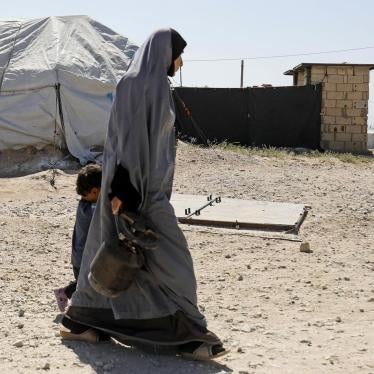On March 13, 2013, security forces broke into the downtown Damascus office where Nidal Nahlawi and his friends were planning relief operations and arrested them. A few weeks later, agents took Nidal to watch them arrest his wife, then returned him to detention. “I will never forget how Nidal looked,” said his wife, Hala, who has since been released. “He was obviously beaten and harshly treated. His face was swollen, he had bruises around his eyes, he looked totally disheveled.”
Born in 1962, Nidal owns a car dealership in partnership with his brothers, and he and Hala have five children, ranging in age from a 23-year-old daughter to an 8-year-old son. As the conflict escalated, Nidal and a group of friends raised funds to buy food, blankets, and other household items to distribute to Damascus families in distress.
When Nidal was first detained, security forces took him to the Mezze Airport Air Force Intelligence Branch, notorious for its ill-treatment of detainees during interrogation, and accused him of supporting terrorism under the July 2012 Counterterrorism Law.
Hala expected security agents to come after her, too, to question her about Nidal’s humanitarian aid work, so she moved out of the family home and stayed with relatives. There security forces found her. After arresting her, agents interrogated Hala about her husband’s activities for 12 hours, overnight, and forced her to hand over the money Nidal had collected to buy food and blankets for the needy. When Hala was released, she hurried home, packed her bags, and fled the country with four of their five children.
The family has had no news of Nidal since he appeared during Hala’s arrest at the end of March. Hala is extremely worried, but knows she must remain strong for her children. The children have not attended school since they fled Damascus, and none of them have any idea what the future holds. Hala, who feels lucky that her family is supporting her, has not registered with the UN agency for refugees. “I hope the children can at least go back to school. They have already missed one year because no school accepted them when we arrived here in the middle of a school year,” said Hala. “Going back to studying and making new friends, would help keep their minds busy, while we all wait for Nidal’s return.”








